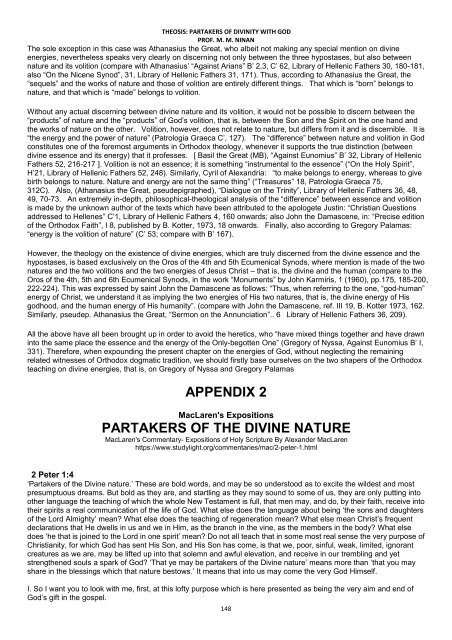Theosis
Create successful ePaper yourself
Turn your PDF publications into a flip-book with our unique Google optimized e-Paper software.
THEOSIS: PARTAKERS OF DIVINITY WITH GOD<br />
PROF. M. M. NINAN<br />
The sole exception in this case was Athanasius the Great, who albeit not making any special mention on divine<br />
energies, nevertheless speaks very clearly on discerning not only between the three hypostases, but also between<br />
nature and its volition (compare with Athanasius’ “Against Arians” B’ 2,3, C’ 62, Library of Hellenic Fathers 30, 180-181,<br />
also “On the Nicene Synod”, 31, Library of Hellenic Fathers 31, 171). Thus, according to Athanasius the Great, the<br />
“sequels” and the works of nature and those of volition are entirely different things. That which is “born” belongs to<br />
nature, and that which is “made” belongs to volition.<br />
Without any actual discerning between divine nature and its volition, it would not be possible to discern between the<br />
“products” of nature and the “products” of God’s volition, that is, between the Son and the Spirit on the one hand and<br />
the works of nature on the other. Volition, however, does not relate to nature, but differs from it and is discernible. It is<br />
“the energy and the power of nature” (Patrologia Graeca C’, 127). The “difference” between nature and volition in God<br />
constitutes one of the foremost arguments in Orthodox theology, whenever it supports the true distinction (between<br />
divine essence and its energy) that it professes. [ Basil the Great (MB), “Against Eunomius” B’ 32, Library of Hellenic<br />
Fathers 52, 216-217 ]. Volition is not an essence; it is something “instrumental to the essence” (“On the Holy Spirit”,<br />
H’21, Library of Hellenic Fathers 52, 248). Similarly, Cyril of Alexandria: “to make belongs to energy, whereas to give<br />
birth belongs to nature. Nature and energy are not the same thing” (“Treasures” 18, Patrologia Graeca 75,<br />
312C). Also, (Athanasius the Great, pseudepigraphed), “Dialogue on the Trinity”, Library of Hellenic Fathers 36, 48,<br />
49, 70-73. An extremely in-depth, philosophical-theological analysis of the “difference” between essence and volition<br />
is made by the unknown author of the texts which have been attributed to the apologete Justin: “Christian Questions<br />
addressed to Hellenes” C’1, Library of Hellenic Fathers 4, 160 onwards; also John the Damascene, in: “Precise edition<br />
of the Orthodox Faith”, I 8, published by B. Kotter, 1973, 18 onwards. Finally, also according to Gregory Palamas:<br />
“energy is the volition of nature” (C’ 53; compare with B’ 167).<br />
However, the theology on the existence of divine energies, which are truly discerned from the divine essence and the<br />
hypostases, is based exclusively on the Oros of the 4th and 5th Ecumenical Synods, where mention is made of the two<br />
natures and the two volitions and the two energies of Jesus Christ – that is, the divine and the human (compare to the<br />
Oros of the 4th, 5th and 6th Ecumenical Synods, in the work “Monuments” by John Karmiris, 1 (1960), pp.175, 185-200,<br />
222-224). This was expressed by saint John the Damascene as follows: “Thus, when referring to the one, “god-human”<br />
energy of Christ, we understand it as implying the two energies of His two natures, that is, the divine energy of His<br />
godhood, and the human energy of His humanity”. (compare with John the Damascene, ref. III 19, B. Kotter 1973, 162.<br />
Similarly, pseudep. Athanasius the Great, “Sermon on the Annunciation”.. 6 Library of Hellenic Fathers 36, 209).<br />
All the above have all been brought up in order to avoid the heretics, who “have mixed things together and have drawn<br />
into the same place the essence and the energy of the Only-begotten One” (Gregory of Nyssa, Against Eunomius B’ I,<br />
331). Therefore, when expounding the present chapter on the energies of God, without neglecting the remaining<br />
related witnesses of Orthodox dogmatic tradition, we should firstly base ourselves on the two shapers of the Orthodox<br />
teaching on divine energies, that is, on Gregory of Nyssa and Gregory Palamas<br />
APPENDIX 2<br />
MacLaren's Expositions<br />
PARTAKERS OF THE DIVINE NATURE<br />
MacLaren's Commentary- Expositions of Holy Scripture By Alexander MacLaren<br />
https://www.studylight.org/commentaries/mac/2-peter-1.html<br />
2 Peter 1:4<br />
‘Partakers of the Divine nature.’ These are bold words, and may be so understood as to excite the wildest and most<br />
presumptuous dreams. But bold as they are, and startling as they may sound to some of us, they are only putting into<br />
other language the teaching of which the whole New Testament is full, that men may, and do, by their faith, receive into<br />
their spirits a real communication of the life of God. What else does the language about being ‘the sons and daughters<br />
of the Lord Almighty’ mean? What else does the teaching of regeneration mean? What else mean Christ’s frequent<br />
declarations that He dwells in us and we in Him, as the branch in the vine, as the members in the body? What else<br />
does ‘he that is joined to the Lord in one spirit’ mean? Do not all teach that in some most real sense the very purpose of<br />
Christianity, for which God has sent His Son, and His Son has come, is that we, poor, sinful, weak, limited, ignorant<br />
creatures as we are, may be lifted up into that solemn and awful elevation, and receive in our trembling and yet<br />
strengthened souls a spark of God? ‘That ye may be partakers of the Divine nature’ means more than ‘that you may<br />
share in the blessings which that nature bestows.’ It means that into us may come the very God Himself.<br />
I. So I want you to look with me, first, at this lofty purpose which is here presented as being the very aim and end of<br />
God’s gift in the gospel.<br />
148

















